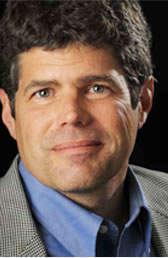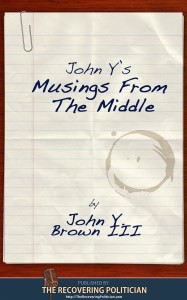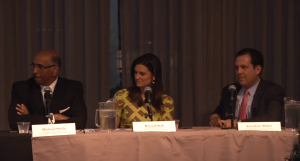By John Y. Brown III, on Fri Oct 18, 2013 at 1:30 PM ET  I joke a lot about being 50. But that isn’t the only age I consider myself. I joke a lot about being 50. But that isn’t the only age I consider myself.
A few hours ago, it was 2:30am on October 18th which is about the exact time I had my last drink of alcohol 28 years ago.
We each, if we are lucky, have our actual birth date and another birth date when we are, some would say, “re-born.” Not necessarily in the religious sense…although it often is.
A line I love which captures this truth well comes from the movie The Natural with Robert Redford playing an aging and ailing baseball superstar. “We live two lives. The life we learn from and the life we live after that.”
I believe that. It’s not a perfect demarcation but it is a profound one. Maybe more crudely put it is the “life we tried to lead” and failed at and the “life we built up from those ashes.” It isn’t really a failure as much as a right of passage.
Most young people are full of vim and vigor and have a limited and self-absorbed view of the the world. Sometimes they crash and burn early, as I did. Sometimes the crash and burn later after having tremendous success. Sometimes they smolder for years until they careen off the road and into a ditch. This is our first life. The war years. The wild years when anything was possible.
Then there is the next life. The reality years. You don’t sell out but integrate and find your place and hopefully a place where you can be and do what you are meant to be and do. Until a person has hit their own self-imposed wall, they may be fun but aren’t terribly useful. Being useful is not a priority during this first life anyway, not really.
The “wall” introduces a person to him or herself. And soon after that a new life, based on the realm of the possible begins. It is a better and more useful life. Not less passionate or less fun or less exciting. But a grown-up (in the best sense of the word) has joined your “road trip” and turned it into a lifelong metaphorical journey. My wall. My old and sated life ending. My new and more useful life beginning all started about this time 28 years ago.
Here’s the post from last year describing the night. Hope it helps someone else in some small way. New lives are like that.
By John Y. Brown III, on Tue Oct 15, 2013 at 3:00 PM ET My surefire plan to end the government shut down.
Each member of Congress has at least one person who knows how to get them out of their stinky mood and coax them out after having locked themselves in their bedroom.
That’s right. It is “Mom.”
Someone needs to call the mother of each member of Congress and explain, “Remember when Rep. (blank) was growing up and would get mad and lock himself (or herself) in his room and threaten not to come out for days? Well…the reason I am calling is….that is happening again and as a matter of national security we really need your help. What sort of “tricks” worked for you to get Rep (blank) to unlock the door any come down to dinner?”
Maybe it is chocolate chip cookies, or playing dress up, or getting to stay up extra late, make fun of gay people, promising to time and listen to their “pretend” filibuster, or raising their allowance 10 cents a week if they would outline how wasteful their siblings were being with their allowance, or agreeing to play Dodgeball or Tag (you’re “It”)
It doesn’t really matter what works ….but finding that secret something that works for each member and then asking their chief of staff to try it on them again this week.
I think this is a pretty ingenious plan….that may just work. Once out of their rooms, we then need to remove the door locks so this can’t happen again.
===
 I have been beating up on Congress the past few weeks, and that helps me vent a bit but isn’t very helpful. I have been beating up on Congress the past few weeks, and that helps me vent a bit but isn’t very helpful.
On a more serious and somber note, I think we all are to blame for the shutdown. In a democracy, our elected officials are pretty much a reflection of the voters electing them. Again, I tried admitting my poor behavior in all this.
I mean….a democratic republic is a government based on the consent of the governed, right? In other words, if you want to know how we can expect our elected officials in Congress to behave, a good place to look is political debates on Facebook.
We are the people who hired them and they are mirroring us and we them. I am frustrated with Congress for the shutdown because I do think that is especially irresponsible. But it is important, in my humble opinion, that we as citizens/voters not wait and hope some elected leader is going to save us from ourselves.
We don’t live under a government system that operates that way. We have to save ourselves and improve how we cope with our own demands, wants and disappointments and differences from others—political and otherwise. As that happens, I believe, we will see an alternation in how Congress debates. Or more precisely, we will see a voting public that demands discussions that are more informed and mature and aiming to resolve questions within the realm of the possible. Maybe not.
I can’t say with a great degree of confidence this is how it works.
But that’s my take on it….and wanted try to explain best I could. I think the blame game from Dems to Repubs and Repubs to Dems and voters to Congress and Congress to voters and on and on and on…. is getting tiring to all and has about run it’s course. As Dr Phil might say, “How’s that working for us?” And as unpleasant as blaming myself can be, at least I feel like I have a little control.
That’s worth something… Just a parting thought for whatever it is worth. (Note: I was paid nothing for it so the market value for my opinion is, well, zero.)
===
America is a great country with a great history of overcoming setbacks, defying our critics and beating the odds against us. We are at our best when things are at their worst.
Why?
Because at the nadir of that dark encompassing moment some inspired person steps up and leads–and leads almost instinctively and with renewed vision and passion.
We are at that point again. Somewhere last night, when members of Congress were caucasing with their party leadership –much like the scene in this video clip–I choose to believe one (or both) party’s experienced one of those soul-riveting moments.
It is “a call to leadership” when some courageous and articulate soul leads us out of our political wilderness and back into everything that makes America great. And that speech, whenever and wherever it happens, will surely look like this (see video clip).
Now, when you watch this clip through the lens of your own partisan biases– whether you see Bluto’s inspirational speech and imagine it is John Boehner or it is Harry Reid– it doesn’t matter. The important thing about this “moment” is that we know we are on the brink of it today….and someone in Congress will inspire others to join them for a higher calling…..like “The best damn night of our lives.” And succeed.
It’s what makes America great. (Warning: inappropriate language…but this is how Congressional leadership works and it can be gritty and ugly sometimes. But inspired too.)
By Nancy Slotnick, on Tue Oct 15, 2013 at 8:30 AM ET I was watching Lena Dunham on Charlie Rose the other day and despite the fact that I’m not loving her new haircut and the second season of Girls is proving to be overly ambitious, I was inspired.
And I shouldn’t be so hard on her. It would be almost impossible not to choke under the pressure that she is facing at such a young age. Emphasis on the almost impossible. Which brings me to the part of the interview that was so inspiring.
When asked about how she accomplished such a meteoric rise, Lena quoted her Dad as saying, “Love the possible.” That stuck with me. Especially because I am trying to make that kind of meteoric rise happen in my life. So I am embracing that idea. My new year’s resolution is, as I have told you previously, (see my blog that quotes Will Smith’s new movie) to be fearless.
 When you are fearless, anything is possible. Or is it? I embarked on a quest to see what is possible and what is in store for me, on a Tuesday morning recently. I was hoping that a store front is in store for me. I was contemplating the fact that anything is possible if you believe that you can achieve it. How do you draw that line? Is it possible that I could go to one of the most expensive neighborhoods in the city and procure a retail space by the end of the day without more than a stick of gum, $20 and a Metrocard in my pocket? When you are fearless, anything is possible. Or is it? I embarked on a quest to see what is possible and what is in store for me, on a Tuesday morning recently. I was hoping that a store front is in store for me. I was contemplating the fact that anything is possible if you believe that you can achieve it. How do you draw that line? Is it possible that I could go to one of the most expensive neighborhoods in the city and procure a retail space by the end of the day without more than a stick of gum, $20 and a Metrocard in my pocket?
Well, let’s see what the universe said. I was able to procure a grilled cheese. And it was good. And then, as I was strolling around, following the path of whatever the universe sent me, I passed by an art gallery with a grafitti-esque painted canvas. It read: “Enough is possible.” Thank you, universe, I have my answer!
Here’s how I interpreted that. Not everything is possible. I will not win the Tour de France in my lifetime. Even if I use performance enhancing drugs and pass the drug tests in the post-Lance-on-Oprah era. But having a bike ride with my son on a weekday and still getting him to get his homework done- that is possible. And that is really great.
What is endemic to the idea that “Enough is possible” is that we need to take action, without waiting for perfection. How many times have you said to yourself “If only?”
Read the rest of…
Nancy Slotnick: Love the Possible
By John Y. Brown III, on Fri Oct 11, 2013 at 12:00 PM ET It’s hard to explain why aging is a pleasant experience and shouldn’t be feared.
Sure, mostly, I guess, we get more comfortable with ourselves and grateful for what is around us and in our lives– and develop more tolerance for the small and large things that disrupt our plans and hopes. But it is still hard to explain in a way that captures well what we are really trying to say.
Think of it this way. You know how when you go away for a week long vacation to someplace you’ve never been and the first few days are intense and chaotic as you travel there, get settled in, feel the high expectations for the trip, worry about leaving work behind at the office, and learn your way around the new surroundings? Well, that’s like life from ages 0-30.
 Then the next few days, you get around to following your itinerary for the biggest events you’ve planned for your vacation and take lots of pictures posing with family and feel a sense of mastery of this new exotic locale. You check off things from your bucket list and relive with those around you at dinner how amazing it was (yet quietly think to yourself that, like most things, it will probably be greater in the memory and re-living of it than it really was at the time). You feel a tinge of worry because you are over-budget but don’t dwell on it because these are important experiences and your credit card limit is high enough to cover everything. It’s worth it. This is like ages 40-60. Then the next few days, you get around to following your itinerary for the biggest events you’ve planned for your vacation and take lots of pictures posing with family and feel a sense of mastery of this new exotic locale. You check off things from your bucket list and relive with those around you at dinner how amazing it was (yet quietly think to yourself that, like most things, it will probably be greater in the memory and re-living of it than it really was at the time). You feel a tinge of worry because you are over-budget but don’t dwell on it because these are important experiences and your credit card limit is high enough to cover everything. It’s worth it. This is like ages 40-60.
Then there are the last couple days when you finally have some “down time.” At last, you have decompressed and unwound enough to really relax. You put work out of your mind and have begun to really focus on where you are and what you are doing and what you are saying and who you are talking to–and what you are thinking about when you are walking alone. You really appreciate the beauty around you and notice the little things in the people and culture around you. You also realize you only have a couple days left–and that both intensifies your gratitude and enjoyment but also makes you a little irritated knowing your the long planned trip is now almost over. But mostly you just enjoy it. Like leisurely licking an ice cream cone without worrying about the calories or that the ice cream is melting before you can eat it. And you don’t worry you don’t have a napkin. It’s not about the ice cream. It’s about the experience. And everything–briefly– is in real time. This is like ages 60-80.
And then it is time to pack up and get ready to go home. Time to check the room one last time to make sure you don’t leave anything behind and have all your belongings accounted for. And time for a final “once around” the property for memory’s sake –and maybe breakfast by the pool and maybe even one last sunrise—before heading to the airport. And on to boarding the flight home where you have a head swimming with pleasant memories –and also some worries anticipating the work left undone back at the office. But you have a low-cal and low-budget pre-packaged snack to comfort you. And although you are surrounded with strangers like yourself you choose to escape with boredom with headphones and a B-level movie as you soar above the clouds and look out the window and think about God. You feel secure that the pilots know what they are doing so you don’t worry when you hit some unexpected turbulence. And you are ready with a mix of anxiety and gratitude when when you hear the landing gear being lowered. And you feel a release of some pleasant brain chemical when you realize you are close to home. This, I suppose, is like the final leg of our trip, ages 80-
By John Y. Brown III, on Thu Oct 10, 2013 at 12:00 PM ET Remember when…
On this day 27 years ago in Louisville, KY it was a balmy and slightly overcast day in which nothing in particular happened.
And that is worth remembering.
Why?
Because more days are like that than have some momentous event occur. And we need to remember and celebrate are most commonplace day.
Just because it may have been forgettable doesn’t mean it should be forgotten.
===
Trending now– “Nothing in particular”
===
 I wish Valvoline offered the human equivalents of a regular oil change and wheel re-alignment.
And without trying to sell me the human equivalent of an air filter I don’t really need. ===
It is important to make the most of each day….and hope to have at least one life moment each day that is worthy of the highlight reel.
Why?
Think about it. What if we get to the end of our lives and it’s our time and up rolls our life’s highlights before our eyes…..you know, those flashes of our the precious, thrilling, sacred and fabulous moments from our life….and what if instead of lasting for the usual 30 seconds, ours only lasts for, say, 17 seconds? And then stops.
Well, I’d be really ticked and spend my last 13 seconds wishing I’d done more exciting stuff when I was younger.
By Artur Davis, on Thu Oct 10, 2013 at 10:00 AM ET The conventional take on the government shutdown is that it is a colossal blunder, but one largely of tactical dimensions: John Boehner underestimating the risk of trying to co-opt Ted Cruz’s brinksmanship gambit; Cruz and his think tank strategists miscalculating public angst over the healthcare law as a license for obstructionism. All true, but at the danger of missing the more substantial reality: the shutdown continues because it is remarkably popular on much of the political right. That is still the case after a week of unmitigated bad publicity for Republicans; it will likely remain so up to and after the point someone invents a fig leaf to make it end. And a Republican base that is undaunted in the face of such a debacle will keep limiting the party’s options with its ready-made barbs about sell-outs and pandering.
And what is an even more depressing truth? Those Republicans who are most at odds with the shutdown have some complicity here too. And no, it is not that they have been weak-kneed deal-cutters whose moderation created a demand for “principled” confrontation. (I have seen only two genuine deals in Washington in nine years: Democrats bending on top bracket tax cuts in late 2010 and Republicans doing the same, from the opposite vantage point, in early 2011, and I don’t hear tax relief for millionaires as an applause line in many Tea Party venues).
The real culpability for us right of center types? They (we) have been too timid in dealing not with Democrats but with a certain variation of conservatism. Those of us on the right who envision conservatism as a brand of public policy and not an enemy of the concept, who conceive that a more cohesive society is a legitimate conservative mission, and don’t confuse the left’s newest ill conceived initiatives with the fading hours before a socialist midnight, could and should have fought harder to keep the right from becoming radicalized. Instead, we soft-pedaled our own sense of responsibility. We bargained on absorbing a hard-right insurgency when we should have been looking harder at its assumptions, and its radicalism.
When it got fashionable to peddle theories that voters—that is, our fellow citizens—were divided between productive contributors to capitalism and coddled takers of government giveaways, too much of the thought leadership of the party sagely nodded. And then when our presidential nominee got caught saying the same thing, we rolled our eyes at his political tin ear without acknowledging that what he said was actually an article of faith in some of our ranks.
We allowed a lot of simplicities to frame our positions on complex issues. For example, we undermined our valid skepticism about the Democratic environmental agenda with muddled charges that science is a conspiracy. We cheapened our warnings about the lingering depth of the Great Recession with pot-shots that the media and the Labor Department were cooking the unemployment numbers.
We showed a little resistance to the hard-right’s musings about abortion and “legitimate rape” and did our share of distancing from mandatory ultrasounds and personhood laws. But the noisiness of these culture wars seemed to worry us more than their inherently un-conservative, big government character—and in our too tepid responses, we missed a chance to arrest the gender gap that is single-handedly turning states like Virginia.
 We just shifted in our seat when the diatribes about the machinations of our liberal opponents crossed lines. When the jabs evolved from ritualistic partisanship into an insinuation that we were facing enemies who didn’t share our reverence for the country, our silence implicitly condoned the vitriol. We just shifted in our seat when the diatribes about the machinations of our liberal opponents crossed lines. When the jabs evolved from ritualistic partisanship into an insinuation that we were facing enemies who didn’t share our reverence for the country, our silence implicitly condoned the vitriol.
We didn’t stress enough over the evidence of a gulf between Americans in our respective visions of culture, of the economy, of the very legitimacy of government. If we were bothered that people who view their adversaries as illegitimate will coarsen civic dialogue, we rarely said so, unless it was the left throwing stones at our crowd.
We properly celebrated the grassroots populism on the right for the pragmatic reason that it finally gave Republicans the organizing mechanism to turn our base out; and for the intrinsic reason that activism is the essence of our democracy. But we weren’t quick enough to insist to the movement-minded among us that a political party is at its core not a movement: a party exists to mobilize to win campaigns and in a fractured electorate, winning requires being coalitional rather than ideologically pristine. We developed a weakness for rewarding provocateurs with the spotlight, as if unseriousness were not a ticket to perpetual minority party status.
We were entirely justified in noticing that conservatism had been demonized into the one permissible category for ridicule and verbal abuse. But we seemed so frustrated at our lost ground that we were tone deaf about how our partisan anger played to a middle class preoccupied with its own struggles—therefore, we missed the impression that we were more outraged about our own powerlessness than the powerlessness of the blue collars who not so long ago were part of our political base.
Read the rest of…
Artur Davis: How the Right Turned Radical
By RP Nation, on Wed Oct 9, 2013 at 10:00 AM ET I think it is agreed by all that our nation is politically fractured. The solution is obvious: cleave in half, becoming two separate but friendly nations with a shared history and a cooperative future.
I make this modest proposal at a time when the government is likely to remain closed for some undetermined period of time and there is an open question about whether we will honor our financial obligations. No one wants these results, but both sides prefer government closure — and potentially default — to forfeiting principle. Rather than a Hobson’s choice why not face the fact that each side should be able to have a representative government that reflects its belief structure? I can claim no special insight in suggesting this reasonable course of action, as the idea originated with Gov. Rick Perry.
For those naysayers who say it cannot be done, I echo Ted Cruz who has asked that we shoot for the moon. How could we determine which parts of America become Country A and which Country B? The answer is clear — we have already picked our future camps. Eighty members of the House of Representatives have asserted that it would be better to have the government close than fund Obamacare. In contrast, other members of the House and large sections of the Senate believe that continuing to fund the government is important, especially since there is no chance that Obamacare will be defunded.
The question of national destiny should be put to a vote, with each House district deciding which country to join. After ten years, the question could be put to the population again. Then the two countries would be set for half a century until there would be one final vote, setting forever the boundaries of two Americas.
Any current U.S. citizen would be free to move to either country — there would be a totally open border. If there would be any areas in which either country might want to work together, they could do so by mutual agreement.
Imagine the relief for both Americas. We could move ahead to deal with such national issues as infrastructure needs, immigration reform, gun control, education, climate mitigation, and such things as harvesting science to advance the national health. Or not. We could predict that one country would include New England, the Washington, D.C.-Boston corridor, the Pacific coastline, and the more populated sections of the west.
 Most of the south and portions of the Midwest would make up the second country, supplemented by numerous rural districts in the west and in Pennsylvania. The good people of this second America truly believe “Obamacare” is killing jobs, are opposed to any gun control, would rather have low taxes on billionaires than ensure that babies have sufficient food, believe that global climate change is a fraud and that Voting Rights legislation limits freedom. Given these beliefs, why should they be married to people with such different viewpoints? Most of the south and portions of the Midwest would make up the second country, supplemented by numerous rural districts in the west and in Pennsylvania. The good people of this second America truly believe “Obamacare” is killing jobs, are opposed to any gun control, would rather have low taxes on billionaires than ensure that babies have sufficient food, believe that global climate change is a fraud and that Voting Rights legislation limits freedom. Given these beliefs, why should they be married to people with such different viewpoints?
And why should the other citizens of America, who believe that a vocal minority of the population have hijacked the nation’s politics and prevented progress, be similarly weighted down?
Give everyone what they want — their own country to govern with cohesive values.
I suggest this not because I have the least personal interest in endeavoring to create two Americas. I have no other motive than the public good of my country, advancing our trade, providing for our children’s future and advancing the hope that some united national purpose may once again bloom, even if it has to bloom twice.
Sharon Heaton, a Friend of The RP, is a Managing Partner at Wellford Energy. This piece was cross-posted at The Huffington Post.
By John Y. Brown III, on Tue Oct 8, 2013 at 12:00 PM ET
Sometimes I stumble across a new website and it is like free falling into a black hole.
I start clicking and next thing I know 45 minutes has passed. Or 2 hours. Or longer.
One topic of interest leads to another topic and so on and so on until you are in a zone and are in the thrall of the thrill of discovering a brand new website that “you get” and that “gets you.”
It can be a time waster, of course…but also very much a reflection of who you really are— and where you are in your life.
Which makes me a little skittish about boastfully recommending the very compelling, timely, topical and substantive new website I found tonight:
AARP.org. ===
AARP is just too stodgy an acronym to make people turning 50 want to join. It doesn’t sound topical or interesting. Or like it has activities that someone 49 would ever look forward to participating in.Instead, it sounds like a place to go to play bingo and have group exercises in tho pool. With a the cafeteria that serves lots of soup and easy-to-chew entrees…..and probably offers prunes as a side dish at every meal.
It’s re-branding time.
We need a new name. And we know how to do this. Or at least the pharma companies that cater to us do.
How about Flomax! (with an exclamation point)? That sounds like an aging super-hero (with a cape and a dignified cane to beat off the bad guys). But it sounds fun too. Like a group with activities such as white water rafting, skiiing, surfing and Boogie Boards (with hand rails). But it’s better than AARP.
I don’t even know what AARP stands for. Ok. I do now. I just looked it up. American Association of Retired Persons. And if you’ll note that is without an exclamation point.
Who wants to join a group that makes you think of being put out to pasture—but protected somehow. And with some group activities so you don’t reach enfeebled oblivion sooner than expected.
No. No. No. If you look at the website it can clearly be cool to be 50 and over. Or at least 50–55. It’s not that old. Not really. OK, it is “that” old. But it’s not, like, a death march. It’s no the end! Only the beginning of the end. Or…..maybe…..the beginning of the beginning of the end. Or BOTBOTE. Bot and bote. Sounds a little French…but so does AARP. But BOTBOTE sounds like some place I wouldn’t mind seeing on the 4th day of a tourist trip to France. Not looking forward to it….but not dreading either. And keeping the possibility open of being surprised. AARP –if it was on the itinerary of the same trip, on the other hand, sounds like something you’d want to avoid before lunch or dinner. And that you’d quickly snap off a few pictures off and leave —before someone mistakes you for someone who belongs in that group rather than a tourist walking by.
I’m going with BOTBOTE. It’s mysterious. Doesn’t seem to ask a lot of us. But if we are at Barnes & Nobles and want the magazine, we wouldn’t have to buy another magazine (like Pscyhology Today) to hide it under as we walked to the counter. BOTBOTE could be something we buy with our coffee in the cafe. Along with a bowl of fancy tomato soup and a over-sized bran muffin. ; )
By John Y. Brown III, on Mon Oct 7, 2013 at 12:00 PM ET  Does it pay to be an author? Does it pay to be an author?
Of course it does.
Sometimes it pays a whole lot.
Other times not so much and you just have to hope to aim higher and hit the next time around.
And at still other times, depending on what sort of math calculations you choose to use, writing can actually cause you to lose money and make you wonder, “Is merely having a book listed on Amazon.com worth the money you are in debt to make this book?”
I can say that of the three categories I am probably most familiar with the third category.
 Above is a copy of my first check for profit on my book Musings from the Middle. I chose not to try to make money off it and charge only about a dollar profit a book just to cover costs. Above is a copy of my first check for profit on my book Musings from the Middle. I chose not to try to make money off it and charge only about a dollar profit a book just to cover costs.
As you can see my first check (which I have been advised is going to be by far my biggest) is $119.12. Now that’s nothing to sneeze at, of course, and is clearly in the “three figure range.” At least until you realize that has to cover a family of four including two teenagers with one in college and one just a few years away. When looked at that way, $119.12 doesn’t sound like as much as it did at first blush.
Given today’s college tuition prices, $119.12 will only cover about 33 minutes of one class your freshman year at a state university.
When you factor in the help I got putting the book together, organizing it, designing a cover, etc, well….all that cost about $400. So when you add the $119.12 to that figure you get something like….well, about — $280.
So let’s assume that over the next year (or five years), I get other checks totaling this amount? I am trying to be realistic. My book is currently ranked on Amazon.com at #1,972,197. Again, nothing to sneeze at. Until you realize that means that 1,972,196 books are ranked ahead of you.
So if I do get a total profit on the book of $240 that means I am only in the hole a mere $160.
 Click here to purchase Which now leads to the big question. Would I pay $160 to be able to say I have a book on Amazon.com?
The answer is, I apparently already have.
Had I not yet done it, I would be willing to pay…..hmmm…..maybe $150. And could see myself caving in if pushed on $160. So, I guess, all in all it is a good deal. And 33 minutes in a class at a state university is nothing to sneeze at–with today’s college tuition prices.
Especially if you are an author.
By RP Staff, on Mon Oct 7, 2013 at 10:00 AM ET  Crisis management and scandal recovery have captured the moment, from big-league sports to New York City’s current political silly season. PR firms are rebranding themselves as crisis advisers. Ex-White House aides are peddling their bona fides. While the public sees scandal through a tabloid lens, at its heart are flawed human beings making mistakes, acting emotionally, and trying to preserve their reputations and careers. “Recovering politicians” who suffered highly publicized scandals share their stories, offer guidance, and comment on the latest attempts to launch second acts. Crisis management and scandal recovery have captured the moment, from big-league sports to New York City’s current political silly season. PR firms are rebranding themselves as crisis advisers. Ex-White House aides are peddling their bona fides. While the public sees scandal through a tabloid lens, at its heart are flawed human beings making mistakes, acting emotionally, and trying to preserve their reputations and careers. “Recovering politicians” who suffered highly publicized scandals share their stories, offer guidance, and comment on the latest attempts to launch second acts.
A conversation with:
Krystal Ball, co-host, MSNBC’s “The Cycle;” former Virginia congressional candidate
Jonathan Miller, Daily Beast columnist; No Labels co-founder; former Kentucky state treasurer
Michael Steele, co-chairman, Purple Nation Strategies; former Republican National Committee chairman
Moderated by:
Jeff Smith, assistant professor of politics and advocacy, The New School; former Missouri state senator
|
The Recovering Politician Bookstore
|
 I joke a lot about being 50. But that isn’t the only age I consider myself.
I joke a lot about being 50. But that isn’t the only age I consider myself.














